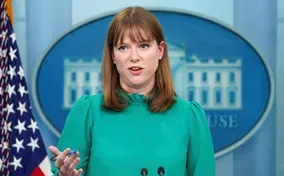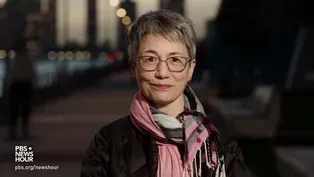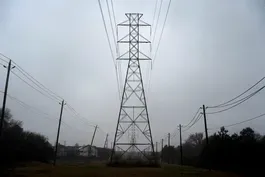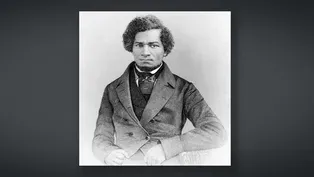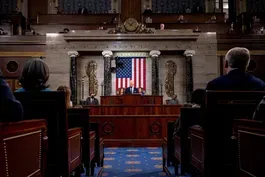
Earthquake death toll rises by thousands in Turkey, Syria
Clip: 2/7/2023 | 12m 25sVideo has Closed Captions
Desperate rescues continue in Turkey and Syria as earthquake death toll rises by thousands
The death toll from the earthquake in Turkey and Syria has reached 7,300 and it's feared many more victims have yet to be found. Search teams are working with ever-growing urgency across a huge swath of areas. Jane Ferguson has the story from Turkey and Nick Schifrin reports on the situation in Syria.
Problems with Closed Captions? Closed Captioning Feedback
Problems with Closed Captions? Closed Captioning Feedback
Major corporate funding for the PBS News Hour is provided by BDO, BNSF, Consumer Cellular, American Cruise Lines, and Raymond James. Funding for the PBS NewsHour Weekend is provided by...

Earthquake death toll rises by thousands in Turkey, Syria
Clip: 2/7/2023 | 12m 25sVideo has Closed Captions
The death toll from the earthquake in Turkey and Syria has reached 7,300 and it's feared many more victims have yet to be found. Search teams are working with ever-growing urgency across a huge swath of areas. Jane Ferguson has the story from Turkey and Nick Schifrin reports on the situation in Syria.
Problems with Closed Captions? Closed Captioning Feedback
How to Watch PBS News Hour
PBS News Hour is available to stream on pbs.org and the free PBS App, available on iPhone, Apple TV, Android TV, Android smartphones, Amazon Fire TV, Amazon Fire Tablet, Roku, Samsung Smart TV, and Vizio.
Providing Support for PBS.org
Learn Moreabout PBS online sponsorshipWe start with the aftermath of the devastating earthquake and aftershocks that have rocked Turkey and Syria.
AMNA NAWAZ: The death toll from the quake disaster has reached more than 7,700 people tonight, and it's feared many more victims have yet to be found.
Search teams are working with ever-growing urgency across a huge swathe of Southern Turkey and Eastern Syria.
Jane Ferguson is on the ground in Turkey and has our report.
JANE FERGUSON: A moment of light surrounded by darkness.
Working overnight in Malatya, Turkey, rescuers pulled a man out from the rubble alive.
Voices shouting from under crumbled concrete are still waiting to be saved.
An immense rescue operation is under way across Turkey and Syria.
Thousands of buildings were leveled.
Rescuers are now battling against time, hoping to reach those stuck below before it's too late.
For many, that wait has already cost lives.
NILUFER SARIGOZ, Turkish Earthquake Survivor (through translator): My sister has four children.
She has one sister-in-law, in-laws, and nephews and nieces.
They're all gone.
They're all gone.
If the rescuers had arrived yesterday, they would have been saved, but they did not come.
JANE FERGUSON: Others have tried in vain to search for family and friends themselves while they wait for rescue teams.
HAVVA TOPAL, Turkish Earthquake Survivor (through translator): My uncle, his wife and his three children are here.
We haven't been able to find them for two days.
We have heard nothing, no news.
The building collapsed after the earthquake, and then a fire started 15 to 20 minutes later.
No firefighters came, no excavators.
We tried to save them on our own by scooping water out with plates.
JANE FERGUSON: Thousands were already displaced before the quakes after a decade of war in neighboring Syria.
Thousands more have now been displaced by the disaster.
Survivors in Malatya are crammed into tents, sitting on cardboard boxes for beds.
But the tents are filling up quickly, and many families were left to wait in the cold for a spot.
Across the border in Northern Syria, rescue crews in Idlib face a daunting challenge combing through mountains of rubble, some with only their bare hands, desperately searching for signs of life.
Farther north in Haram, shouts echoed across a crowded rescue site as a little girl was plucked from the rubble and carried to safety.
Hospitals and health clinics across Northern Syria are overwhelmed.
Many of those facilities were already understaffed and ill-equipped after years of war.
AHMAD AL-ADNAN, Syrian Earthquake Survivor (through translator): Thank God my home was not impacted, but there were 10 buildings beside us that fell all at once, an entire neighborhood all at once.
JANE FERGUSON: Some of those who did manage to escape unharmed are now braving the cold, living on the streets of Aleppo.
They're afraid to go home.
IBRAHIM EID, Syrian Earthquake Survivor (through translator): You saw how a whole building just falls.
It is terrifying.
It is not as if mortars hit here or there.
Here, you walk in the streets, ambulances are everywhere, buildings are falling, people are walking in the streets.
There are bodies.
JANE FERGUSON: The Syrian Red Crescent said more than 120 temporary shelters have now been set up for displaced families.
This school in Aleppo is one of them.
KINDA KORDI, Syrian Earthquake Survivor (through translator): To be honest, this is harder than war.
At war, there's a strike and it passes.
Here, we don't know when it ends.
We are terrified.
JANE FERGUSON: For the "PBS NewsHour," I'm Jane Ferguson in Turkey.
AMNA NAWAZ: We will focus now on the Syrian side of the border.
Idlib province, the final stronghold of rebels fighting Syrian government forces, was particularly hard-hit by the earthquake.
Nick Schifrin has that story.
NICK SCHIFRIN: The earthquake devastated a region already scarred by a brutal war.
For more than a decade, the residents of Idlib have endured bombardment by the Syrian military and its Russian allies, as well as one of the world's largest humanitarian crises.
The Syrian civil defense, known as the White Helmets, has spent years trying to say victims of bombings.
Now they're one of the few aid groups operating on the ground trying to save victims of the earthquake.
Ismail Alabdullah is a volunteer.
ISMAIL ALABDULLAH, White Helmets: Northwest Syria, now it's a disaster area.
We need help from everyone to save our people.
NICK SCHIFRIN: And Ismail Alabdullah joins me now from Sarmada in Idlib province.
Ismail Alabdullah, thank you very much.
Welcome to the "NewsHour."
You and your teams have spent the last couple days combing through the debris of people's homes, of buildings that have collapsed, trying to save people's lives.
What are the conditions right now?
ISMAIL ALABDULLAH: The largest scale of destruction, the largest scale of the rubble made great difficulty that we are facing right now.
The earthquake, it caused massive damage in every city and village.
Every village, there are many buildings collapsed completely on the families, entire families under the ground, under the rubble.
NICK SCHIFRIN: In the videos that you're posting and that we have here and that we're showing right now, it seems like you and your teams are going hand by hand trying to rescue people with whatever tools you have.
ISMAIL ALABDULLAH: They are working around the clock to respond.
We used to respond to a bombing by the -- assess first.
It's totally different.
Each site has three or four - - three or four buildings collapsed.
We are removing the rubble by our hands and by the equipment that we have.
NICK SCHIFRIN: And what about you and your family personally?
How did you experience this earthquake?
And what happened to the people who lived right next to you?
ISMAIL ALABDULLAH: I was asleep beside my children when the earth start to shake violently and quickly.
I responded immediately to hold my kids, to go out of the house to avoid this -- this horrible scenario that the ceiling and the -- to collapse on us.
I heard voices screaming next to us, close to us.
It was like -- it was our neighbors.
Their houses collapsed on them.
And, as I know, 17 people died in that collapse.
I went to the site.
I couldn't handle -- I couldn't hold my tears when I saw the people screaming, seeing and hearing the voices calling for help.
NICK SCHIFRIN: You said it yourself.
This is different than the war.
But so many of the people we're talking about have been through many, many years of this war.
How much more pain are they suffering now because of this earthquake?
ISMAIL ALABDULLAH: Earthquake made the suffering - - doubled the suffering of the people.
It came in the time of winter, in -- with the winter itself, it's disaster, disaster in Northwest Syria.
It's not like in other countries.
Here, people don't have something, anything to warm their children, to keep their children warm and during the cold and harsh winter.
Beside this, besides all this, in the first place, they were displaced.
Me, I was displaced four times.
All the people were displaced, and now they're suffering.
Those people who are now injured, they don't have a place to go.
They don't have houses.
Their houses collapsed.
We're talking here about thousands of people.
They need shelter.
NICK SCHIFRIN: The Syrian government and its Russian allies have specifically targeted hospitals for many years.
Are their medical facilities?
Is their medical care for the people who need it?
ISMAIL ALABDULLAH: The whole world knows that Russia and Assad made the hospital targets, killed doctors, destroyed the medical equipment.
The health sector already is exhausted, and now, dealing with this catastrophe, they will not be able to -- they don't have enough doctors.
They don't have even the medical supplies.
So, that's why also we're calling to help.
Maybe they -- maybe they can open the gate for doctors.
Maybe they can open the gate for those who were injured to go to Turkey.
NICK SCHIFRIN: What do you most need right now?
ISMAIL ALABDULLAH: We need heavy equipment to move -- to remove the massive scale of the rubble.
And we need, like, generators, because we don't have that electricity to work.
We need diesel.
We need help.
We need international efforts to help us, help us.
To everyone to -- watching and listening, help those people, and consider them as human beings.
AMNA NAWAZ: That was Ismail Alabdullah with the White Helmets.
AMNA NAWAZ: We now turn to Turkey's ambassador to the United States, Hasan Murat Mercan.
I spoke to him a short while ago and began by asking him what it's like to see this stunning death toll rise as the rescue operations continue to unfold.
HASAN MURAT MERCAN, Turkish Ambassador to the United States: Well, I cannot imagine where it will lead, it will go, but it can go -- it can go worse.
Also, people are in the tents right now, in the school buildings.
So, the situation is not very good, to say the least.
AMNA NAWAZ: As you well know, the U.S. has already pledged any and all needed assistance.
The European Union has mobilized search-and-rescue teams.
Are your country's most urgent needs being met right now?
HASAN MURAT MERCAN: First of all, a few hours after the earthquake took place, which was evening, in Washington time, State Department and White House officials approached us and clearly stated their sorriness and, at the same time, said that they are ready to help in any way we need.
They have dispatched two rescue teams.
And we still need more rescue teams, because clearing all these rubbles in very careful manner, hoping that there are some people under the rubbles require a lot of manual human work.
So, we still need new rescue teams.
So we need a lot of winter materials, winter clothing, which in being -- which is being provided by American companies -- American citizens, Turkish citizens living in the United States.
AMNA NAWAZ: President Erdogan did declare a three-month state of emergency.
And the last time Turkey was under a state of emergency was in 2016 after the failed coup attempt.
That lasted two years back then.
Why is a state of emergency necessary now?
HASAN MURAT MERCAN: Now state of emergency is necessary because there are a lot of humanitarian aid needed, construction needed.
Roads needs to -- need to be reconstructed.
There are thousands of buildings right now.
And looting is possible.
Under these circumstances, there are always really bad people, bad intention that try to do something.
Everything has to be coordinated.
A state of emergency will help our rescue teams all over the - - rescue teams work more efficiently.
AMNA NAWAZ: Mr.
Ambassador, we are keeping you and the people of Turkey in our thoughts.
We thank you so much for joining us tonight.
HASAN MURAT MERCAN: Thank you.
AMNA NAWAZ: That is Turkey's ambassador to the United States, Hasan Murat Mercan.
Thank you.
HASAN MURAT MERCAN: Thank you very much.
Biden to outline accomplishments and tout optimism for U.S.
Video has Closed Captions
Clip: 2/7/2023 | 6m 4s | Biden to outline accomplishments and tout optimism for U.S., White House spokesperson says (6m 4s)
A Brief But Spectacular take on the power of poetry
Video has Closed Captions
Clip: 2/7/2023 | 2m 30s | A Brief But Spectacular take on the power of poetry (2m 30s)
FBI foils plot to bring down Baltimore’s electrical grid
Video has Closed Captions
Clip: 2/7/2023 | 6m 34s | FBI foils extremist plot to bring down Baltimore’s electrical grid (6m 34s)
New England and Frederick Douglass' first steps to freedom
Video has Closed Captions
Clip: 2/7/2023 | 6m 51s | New England's role in Frederick Douglass' first steps to freedom (6m 51s)
S.D. Sen. Thune on what he wants from State of the Union
Video has Closed Captions
Clip: 2/7/2023 | 8m 1s | South Dakota Sen. John Thune on what he wants to hear from State of the Union (8m 1s)
What to expect from Biden's State of the Union address
Video has Closed Captions
Clip: 2/7/2023 | 5m 24s | What to expect from Biden's State of the Union address (5m 24s)
Providing Support for PBS.org
Learn Moreabout PBS online sponsorshipSupport for PBS provided by:
Major corporate funding for the PBS News Hour is provided by BDO, BNSF, Consumer Cellular, American Cruise Lines, and Raymond James. Funding for the PBS NewsHour Weekend is provided by...
